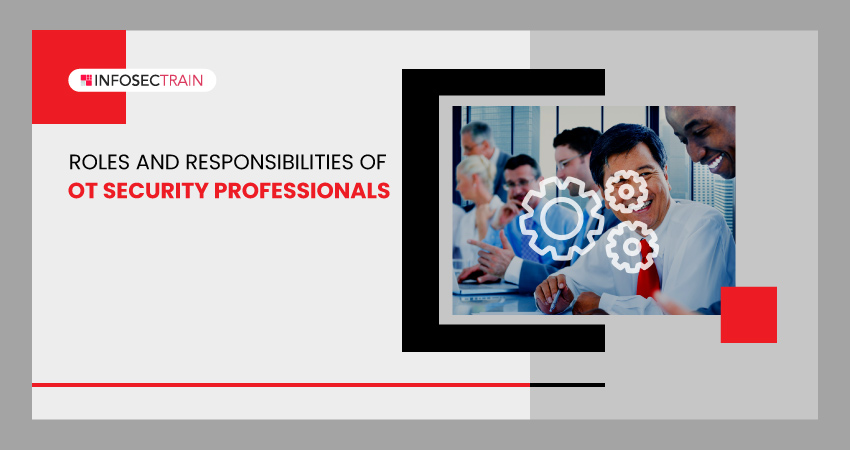Roles and Responsibilities of OT Security Professionals
In today’s digital era, where technology permeates every aspect of our lives, protecting critical infrastructure and Industrial Control Systems (ICS) has become an utmost priority. With cyber threats looming large, organizations are turning to Operational Technology (OT) and ICS security professionals to defend against potential attacks and ensure the uninterrupted functioning of essential operations.

This blog explores the vital roles and responsibilities shouldered by these skilled individuals and their indispensable contributions to cybersecurity in critical sectors.
Table of Contents
Understanding OT and ICS
Roles of OT/ICS Security Professionals
Responsibilities of OT/ICS Security Professionals
Understanding OT and ICS:
Before diving into the roles and responsibilities of OT/ICS security professionals, let’s take a moment to understand what OT and ICS entail.
Operational Technology (OT) encompasses the hardware and software used to monitor and control physical processes in various sectors, from manufacturing to aviation and power distribution. It involves the management and supervision of infrastructure, devices, and operations critical to the functioning of these industries.
Industrial Control Systems (ICS) are a subset of OT and are intelligent platforms responsible for automating and controlling physical processes. ICS systems act as microcontrollers, receiving input from sensors and employing predefined logic and applications to make decisions and regulate operations. They play a crucial role in industries where precise monitoring, automation, and control of parameters like flow, pressure, and temperature are essential, ensuring smooth operations and maintaining safety.
Now that we have a brief understanding of OT and ICS let’s delve into the roles and responsibilities of OT/ICS security professionals.
Roles of OT/ICS Security Professionals:
These skilled individuals are responsible for protecting critical infrastructure and ensuring the secure operation of industrial control systems. Here are three key roles in the field:
- OT/ICS Security Analyst: OT/ICS Security Analysts conduct risk assessments, vulnerability management, and security testing. They analyze system architecture, network traffic, and logs to identify weaknesses. They implement security controls, develop incident response plans, and ensure compliance with regulations.
- OT/ICS Architect: OT/ICS Architects design secure system architectures for critical infrastructure, implementing network segmentation, access controls, and intrusion detection systems. Their expertise ensures reliable operations in OT/ICS environments.
- OT/ICS Incident Responder: OT/ICS Incident Responders specialize in incident response and play a critical role in mitigating and resolving security incidents. They possess in-depth knowledge of OT/ICS systems, protocols, and forensic analysis techniques.
Responsibilities of OT/ICS Security Professionals:
- Risk Assessment and Vulnerability Management: OT/ICS security professionals are responsible for conducting comprehensive risk assessments to identify vulnerabilities, potential threats, and their potential impact on critical systems. They perform regular vulnerability scans, assess system architecture, and implement robust strategies for effective risk mitigation.
- Security Architecture Design: Creating secure and resilient OT/ICS architectures is a key responsibility of these professionals. They design and implement network segmentation, robust access controls, and advanced intrusion detection/prevention systems, fortifying the infrastructure against potential intrusions and attacks.
- Security Policy Development: OT/ICS security professionals are crucial in establishing comprehensive security policies and procedures. By defining and implementing stringent security standards, access controls, and incident response protocols and conducting regular security awareness training, they cultivate a security-conscious culture within the organization.
- Threat Monitoring and Incident Response: With their vigilant eyes on the systems, OT/ICS security professionals continuously monitor potential threats. Rapid incident response is their forte as they investigate and contain incidents, working closely with cross-functional teams to ensure timely remediation.
- Security Testing and Assessment: Professionals carry out regular security testing and assessments to proactively identify weaknesses and vulnerabilities in OT/ICS systems. Through penetration testing, vulnerability assessments, and security audits, they provide valuable insights, enabling organizations to implement effective remediation measures.
Conclusion:
The roles and responsibilities of OT/ICS security professionals are critical for protecting vital infrastructure and industrial control systems. Their expertise in risk assessment, security architecture design, incident response, and compliance ensures the resilience of essential operations. As cyber threats continue to evolve, professionals in this field must stay updated with the latest knowledge and skills.
If you are passionate about securing OT/ICS systems and want to gain comprehensive expertise, we recommend exploring the OT/ICS Security Foundation Training by InfosecTrain. This training program aims to provide a holistic understanding of OT/ICS components, architecture, tools, technologies, and best practices.
Sign up now to secure your spot and contribute to a safer future.







 1800-843-7890 (India)
1800-843-7890 (India)